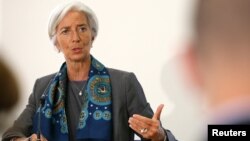International Monetary Fund Managing Director Christine Lagarde, who Forbes Magazine calls "the fifth most powerful woman in the world," is now under the cloud of a corruption probe.
The investigation by France’s Court of Justice of the Republic concerns actions taken in 2008 when she served as the nation’s finance minister. The state paid business tycoon Bernard Tapie nearly $526 million to settle a dispute he had with a former state-owned bank, Credit Lyonnais. The bank is now privatized and doing business as "LCL."
Tapie’s career has been filled with controversy. He served as the minister for urban affairs under President Francois Mitterand, but his main focus has been owning sports teams and turning around failing businesses.
His Olympique de Marseille football club won a national championship. In 1997, Tapie served six months in prison for match fixing involving his team. Tapie also owned a cycling team that won the Tour De France twice.
The massive arbitration settlement has triggered accusations that it came about as a "quid pro quo" exchange in response to Tapie’s abandoning his long-term allegiance to the Socialist Party, switching his support to center-right Nicholas Sarkozy’s successful 2007 presidential bid. The corruption probe is examining whether Lagarde was negligent” under the law in allowing the Tapie claim to be settled.
In France’s legal system, a person can be placed under formal investigation when there is evidence of possible wrongdoing, but that doesn’t automatically lead to a trial. If convicted on "simple negligence," Lagarde would face a maximum of a year in prison and a fine of 15,000 euros ($19,716).
Legarde’s response to the investigation, which opened in August 2011, was blunt.
"After three years of investigations [and] dozens of hours of questioning," she said, "the [investigatory] commission realized that I was not complicit in any violation, and has therefore been reduced to allege that I may not have been sufficiently vigilant in the arbitration."
Lagarde has repeatedly denied any improprieties in the arbitration, insisting that the commission acted independently and in the best interests of French taxpayers.
The case under investigation involves the 1993 sale of sportswear giant Adidas, which Tapie bought in 1990.
Tapie claimed that he was defrauded in that transaction by Credit Lyonnais, which he asserts significantly undervalued Adidas as the bank took a 19 percent stake in the company. Tapie demanded compensation from the French government because it was Credit Lyonnais’ principal shareholder.
The businessman, who reportedly pocketed half – about $263 million – of the government’s payout after taxes and legal fees, insists that he is fully entitled to the money. He has described the probe as a politically motivated attack on Sarkozy by the opposition Socialists, who are once again holding the president’s post under Francois Hollande. His supporters say the push for the Lagarde probe comes from Socialist Party figure Jean-Marc Ayrault, who served as prime minister under Hollande from 2012 to 2104.
Also under investigation is Lagarde’s chief of staff while she was finance minister, Stephane Richard, now the head of France’s top mobile phone system, Orange. The probe into Richard and several others is separate from the Lagarde investigation.
The media in France has made this story very visible, as it did when the previous IMF Managing Director, Dominique Strauss-Kahn, resigned in 2011 after being accused of sexually assaulting a hotel worker in New York.
The IMF chief’s legal team may file an appeal against the government’s move to formally investigate her. If that strategy is pursued, the process may well extend beyond Lagarde’s five year term at the IMF, which expires in July 2016. One of her lawyers, Christopher Baker, told the Financial Times that if her appeal is rejected, she would likely take her case to France’s top judicial body, the Court of Cassation.
The IMF’s 24-member board – which has the power to dismiss Lagarde – is standing by her.
“The Executive Board,” its statement read, “has been briefed on recent developments related to this matter, and continues to express its confidence in the Managing Director’s ability to effectively carry out her duties.”
Former IMF official Desmond Lachman, who told Agence France Presse that Lagarde’s performance there has not been affected by the probe.
“Ms. Lagarde,” he said, “has been rather effective in leading the IMF. It hasn’t really affected the way in which she has been running the organization in the past three years. I don’t see why this development would change that.”





